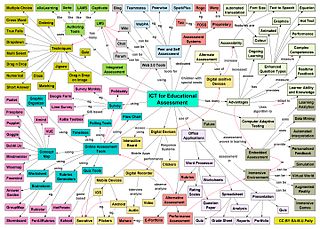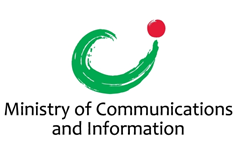Related Research Articles
Telecommunications had an early beginning in Mauritius, with the first telephone line installed in 1883, seven years after the invention of the telephone. Over the years, the network and telephony improved. By the late 20th century, the rapid development and convergence of information and telecommunications technologies gave rise to an ICT industry on the island along with many incentives provided by the government. The government thus aims to make the ICT sector the 5th pillar of the Mauritian economy and Mauritius a Cyber Island. Historically, the country is known for tourism, rather than its call centers and business process outsourcing.

Iran's telecommunications industry is almost entirely state-owned, dominated by the Telecommunication Company of Iran (TCI). Fixed-line penetration in 2004 was relatively well-developed by regional standards, standing at 22 lines per 100 people, higher than Egypt with 14 and Saudi Arabia with 15, although behind the UAE with 27. Iran had more than 1 mobile phone per inhabitant by 2012.

Information and communications technology (ICT) is an extensional term for information technology (IT) that stresses the role of unified communications and the integration of telecommunications and computers, as well as necessary enterprise software, middleware, storage and audiovisual, that enable users to access, store, transmit, understand and manipulate information.

Nasrollah Jahangard is an Iranian politician currently serving as the deputy minister of ICT in Technology and Innovation.

NICTA was Australia's Information and Communications Technology (ICT) Research Centre of Excellence and is now known as CSIRO's Data61. The term "Centre of Excellence" is common marketing terminology used by some Australian government organisations for titles of science research groups. NICTA's role was to pursue potentially economically significant ICT related research for the Australian economy.

Education in Rwanda has undergone considerable changes throughout Rwanda's recent history, and has faced major disruptions due to periods of conflict. Education was divided by gender whereby women and men had a different education relevant to their responsibilities in day-to-day life. Women were mostly taught housekeeping while men were mainly taught how to hunt, rear animals, and fish. This is because Rwanda was a community based society where every member had a specific contribution to the overall development of the community. Older family members like grandparents usually took on the role of Educators.

The Ministry of Communications and Information is a ministry of the Government of Singapore responsible for overseeing the development of the infocomm technology, cyber security, media sectors, as well as the government’s information and public communication policies. It is also responsible for maintaining the national library, national archives and public libraries.
Internet in Tajikistan became present within the country during the early 1990s. Tajikistan had just become independent in 1992, with Emomali Rahmon as the new ruler, when the internet was introduced to the country. Nevertheless, it was after over a decade that the country’s internet became more accessible. The history of the internet’s foundation in Tajikistan extends from 1992 to present-day Tajikistan. By 2009, internet penetration had developed since the initial conception of the internet in Tajikistan and Internet Service Providers (ISPs) had increased in number. In terms of the ISPs, Tajikistan primarily relied upon satellite-based connections using Discovery Global Networks.
The Communications Authority of Kenya (CA) is the regulatory authority for the ICT industry in Kenya with responsibilities in telecommunications, e-commerce, broadcasting and postal/courier services. The CA is also responsible for managing the country's numbering and frequency spectrum resources, administering the Universal Service Fund (USF) as well as safeguarding the interests of users of ICT services.
The Global e-Schools and Communities Initiative is an international not-for-profit organisation providing demand-driven assistance to developing countries seeking to harness the potential of Information and Communication Technologies (ICT) to improve their education systems.
All European countries show eGovernment initiatives, mainly related to the improvement of governance at the national level. Significant eGovernment activities also take place at the European Commission level as well. There is an extensive list of eGovernment Fact Sheets maintained by the European Commission.

The Ministry of Information and Communications Technology, or Ministry of ICT established in 1908, is responsible for postal services, telephones and information technology in the Islamic Republic of Iran.

The Egyptian Ministry of Communications and Information Technology (MCIT) is a government body headquartered in Smart Village Egypt, Giza Governorate, in the Cairo metropolitan area. Established in 1999, the Ministry is responsible for information and communications technology (ICT) issues in the Arab Republic of Egypt including the planning, implementation and operation of government ICT plans and strategies. It is led by the Minister of Communications and Information Technology, who is nominated by the Prime Minister and is a member of the cabinet. The current ICT Minister is Amr Talaat who assumed the position on 14 June 2018.

The use of new media in Ghana like elsewhere is growing. The Information and Communications Technologies (ICT) sector, which is based on a free market approach, has promoted new media use. Most popular aspects of new media to Ghanaians is the Internet, and its associated mobile and desktop applications for education, health, politics, business, publishing, governance and so on. Also popular is the use of mobile devices like smartphones and tablets and computers.
Information and communication technology (ICT) in Kosovo has experienced a remarkable development since 1999. From being almost non-existent 10 years ago, Kosovar companies in the information technology (IT) domain offer today wide range of ICT services to their customers both local as well as to foreign companies. Kosovo has the youngest population in Europe, with advanced knowledge in ICT.
National Information Technology Agency (NITA) is a public service institution established by Act 771 in 2008 as the ICT policy implementing arm of the Ministry of Communications of the Republic of Ghana. NITA is the agency responsible for implementing Ghana's IT policies.

The Ministry of Communication and Technology is the government ministry responsible for the development of communication and technology in Ghana. Its mission is to pursue policies that will lead to the cost-effective creation of information and communications infrastructure and services in order to promote economic competitiveness in line with the policy guidelines of the Medium Term National Development Policy Framework (MTNDPF) developed as the basis of the Ghana Shared Growth and Development Agenda (GSGDA). The ministry's offices are located in Accra, Greater Accra.
The Ministry of Communications and Information Technology (QATAR) (MCIT) is a Qatari ministry that was established within the new cabinet formation announced in June 2013 to be an extension of the Supreme Council of Information and Communication Technology that was established under Emiri Decree Law no. 36 of 2004.

The Department of Information and Communications Technology (DICT) is the executive department of the Philippine government responsible for the planning, development and promotion of the country's information and communications technology (ICT) agenda in support of national development.
References
- ↑ "Information and communications technology (ICT) to Iran - For Australian exporters - Austrade". Archived from the original on 2008-04-19.